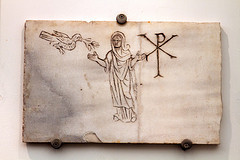... why (are) there are no Christian soldiers in the army till 175 and why so few from 175 till 310? Was it the violence connected with the army or the idolatry? Or did it perhaps have something to do with the fact that the words, "love your enemies" as a summary of their faith were among the most often quoted by the 2d-century Christians?" -The Anchor Yale Bible Dictionary, 1992, Doubleday. Volume 6, Page 868 (ABD).
Of Wallings and Waterboardings
The CIA and its interrogation techniques in the wake of 9/11 and the "war on terror" have been in the news again recently, as the Senate Select Committee on Intelligence released a previously top secret 525-page report, with plenty of redaction, and with the title of "Committee Study of the Central Intelligence Agency's Detention and Interrogation Program."
In essence, the report outlines in fairly graphic terms the Senate Committee's findings that the CIA went too far in its use of torture techniques -- including slaps (whence a detainee might be hooded and dragged up and down a corridor while being slapped and punched), "wallings" (where detainees are slammed hard against a wall), sleep deprivation (up to 180 hours -- more than a week!), a fun little technique the CIA likes to call "rectal rehydration," ice water "baths," threats to family (including harm to children and, in at least one case, the threatened sexual abuse of a detainee's mother), and -- everyone's favorite -- "water boarding."
The waterboarding technique was physically harmful, inducing convulsions and vomiting. [One detainee], for example, became 'completely unresponsive, with bubbles rising through his open, full mouth.' Internal CIA records describe the waterboarding of [another] as evolving into a "series of near drownings." -page 10 of the report.
Jack Bauer and 24
cc
Even so, in the same year that saw the return to television of Jack Bauer of 24, famous for several seasons of going both rogue and too far -- all the while getting the job done -- the CIA and its supporters have countered with a simple reminder that their "enhanced interrogation" techniques have sometimes yielded results. And indeed, the truth behind the two narratives represented by critics and proponents likely lies somewhere in the middle.
As Yale law professor Stephen Carter pointed out in an interview on an NPR broadcast Dec. 13, "It strikes me that you can have a program that is immoral and also occasionally produces good information."
Almost from the beginning of their movement, Christians have been in the center of the controversy surrounding justice and war-time tactics. In the imperial Roman era, within a century of the conversion of Constantine that turned Christian criminals into celebrated Roman beneficiaries overnight, Augustine is credited with developing the ethical boundaries around a "just war," tackling two parallel lines of inquiry: When does a nation have the right to go to war? And what are the right sorts of conduct within war? Thomas Aquinas would build on Augustine, considering "just war" ethics in a post-imperial era of nation-states in the 13th century.
Both Augustine and Aquinas argued against the common ethical (if cynical) understanding in the Greek era, as documented in Plato's Republic -- simply, "justice is the interest of the stronger" or "might is right." History, as they say, is written by the winners.
The United States has done a lot of winning and perhaps authored a great deal of world history since WWII. But now it seems, we may be over-reaching. When we speak of "nation-building," are these the sorts of nations we hope to build -- states that are willing to do whatever it takes to coerce their enemies into submission?
The Earliest Christians
cc
Christian historians can argue over the early Church stance toward the military, but there is clear evidence that military service was not considered an honorable vocation in at least some quarters of the Church. Witness the declaration of Origin in the 3rd century: "When Christ disarmed Peter, He disarmed every soldier." Indeed, it wasn't till the Church was embraced and sponsored by Rome that the plain words of Jesus seemed to fade and become contorted in the echo chamber of history.
Speaking of these plain words, in our day Wendell Berry, the poet-farmer, has noted that "... one cannot be aware both of the history of Christian war and of the contents of the Gospels without feeling that something is amiss." Berry writes this in a book where the words of Jesus resonate anew, Blessed Are the Peacemakers: Christ's Teachings About Love, Compassion and Forgiveness.
People of faith ought to carefully consider what Augustine proposed as he outlined the boundaries of state-sponsored military action. "When does a nation have the right to go to war?" Perhaps people of good conscience can disagree on this point, as we consider the history of America's war on terror. But what of that second question? " What are the right sorts of conduct within war?"
If you haven't yet read at least as much of the report as you can stomach, I commend it to you. Consider the words of Jesus as you read, and ask yourself the trite-but-true question: "WWJD"?
In the great cathedral of Christian history, some Christians have been able to provide an answer to the question of a nation's right to wage war by saying "it is just because ...", but we tread on thin ice when society asks us why we believe torture is acceptable for us but not for other nations and our unsatisfying answer is "just because ...."
